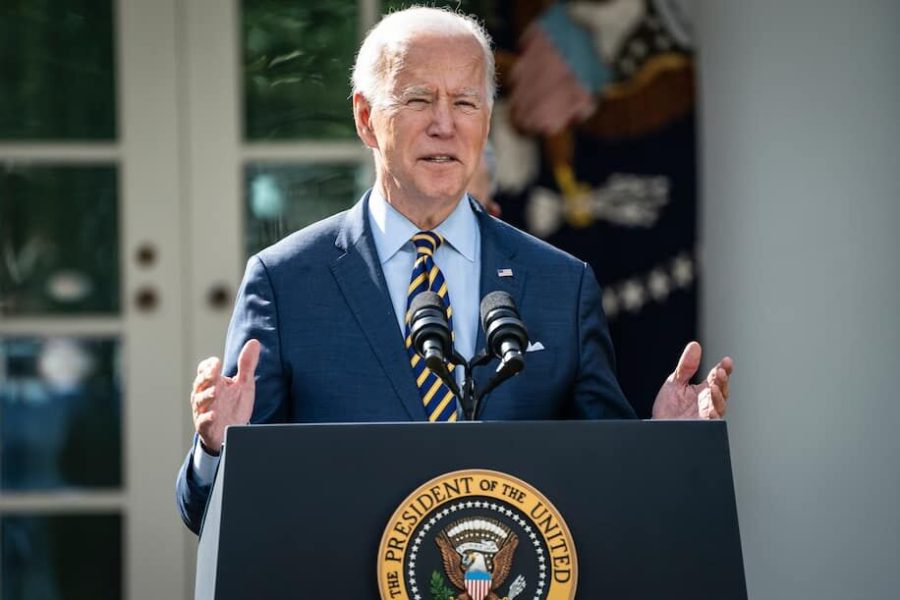Opinion: Biden’s Foreign Policy is More of the Same
Courtesy of Jabin Botsford/The Washington Post
President Biden spoke at the White House on Friday.
March 17, 2021
One of the most persistent specters to haunt President Joe Biden as he made his case on the 2020 campaign trail was his long history of hawkish military interventionism. During the Democratic primary, left-wing critics of Biden and his opponent Senator Bernie Sanders rightly called into question his long, ugly record of supporting America’s endless imperial wars. This ranged from his worst sins — helping former President George Bush increase bipartisan support for his invasions of Afghanistan and Iraq as the chairman of the Senate Foreign Relations Committee — to his less-remembered roles in former President Barack Obama’s expansion of the drone war and entrance into conflicts in Libya, Syria and Yemen.
Public opinion has long-since turned against the garrison state Biden has helped to construct since 9/11. One 2020 poll from YouGov showed that three-fourths of Americans support the removal of troops from Iraq and Afghanistan. Another from Axios shows that only 27% believe US military interventions make the country safer. To those like myself, who found Biden’s foreign policy record to be a major black mark, his promises on the campaign trail of ending our involvement in Iraq and Afghanistan, retracting US arms support in Yemen’s horrific civil war and re-entering Obama’s nuclear agreement with Iran were major factors in the decision to vote for him despite his shortcomings.
Now that we’re nearly two months into Biden’s administration, it’s clear that his overtures toward a rollback of US military involvement were merely a cynical and perfunctory recognition of the political tides. In reality, nothing about Biden’s worldview has fundamentally changed.
The sinking feeling that this was the case began before Jan. 20, with the rollout of Biden’s cabinet and intelligence community staff, which was packed with some of the national security establishment’s worst ideological supplicants and crass profiteers.
Secretary of State Antony Blinken, for instance, was hinged to Biden during the deadliest mistakes of his career. In the lead-up to the Iraq War, Blinken was instrumental in stacking Senate Foreign Relations Committee meetings led by Biden. These were filled with testimonies from witnesses including pushing the party line on Saddam’s aid to Al-Qaeda and possession of weapons of mass destruction while ignoring dozens of scholars and foreign service officers who raised doubts. As Obama’s deputy national security advisor in 2011, Blinken also helped to push the administration toward the disastrous overthrow of Muammar Qaddafi in Libya, which facilitated that country’s descent into sectarian violence. After leaving government service, Blinken went on to found the secretive consulting firm WestExec. Its client list remains undisclosed, but, as The American Prospect’s Jonathan Guyer learned from conversations with members of the firm, the list included “An Israeli surveillance startup,” “a major U.S. defense company,” “Google billionaire Eric Schmidt” and other Fortune 500 companies.
Other key Biden officials are cut from a similar cloth, representing both ends of the military-industrial complex. Director of National Intelligence Avril Haines was an architect of Obama’s drone war expansion and, according to Newsweek, was often called late at night to determine whether the US should carry out extrajudicial drone assassinations. As deputy CIA Director, Haines also allowed CIA officers off the hook who hacked into Senate Intelligence Committee computers to tamper with a report on the CIA’s use of torture.
Meanwhile, Defense Secretary Lloyd Austin, a retired four-star general, made his bones as a board member for Raytheon, which has supplied armaments to the Saudi government in its ongoing war in Yemen. Upon stepping down from the board to accept Biden’s nomination, Austin received a $1.7 million payout from his ownership of Raytheon stock.
Likewise, Biden’s foreign policy actions since taking office have all but solidified that, for all his talk, he is less interested in remaking American foreign policy than putting a fresh coat of paint on the status quo.
For instance, two weeks ago, Biden continued former President Donald Trump’s dangerous tit-for-tat provocations with Iran when, without Congressional approval, he launched an illegal airstrike against a base in Syria – a country the US is not at war with – because it was suspected of harboring militias backed by Iran, which is another country the US is not at war with. This action is one of many that have been gravely irresponsible on Biden’s part with respect to Iran, with whom he claims to want to detente through a re-entry of Obama’s nuclear agreement. Trump violated the agreement by reinstating sanctions on Iran, which led Iran to begin violating its own promise not to enrich uranium beyond agreed-upon levels. According to the international watchdog responsible for monitoring this, Iran was meeting these terms before Trump pulled out.
Biden still claims to desire re-entry into the deal, but with the added caveat that Iran must first “return to strict compliance” with the terms of the agreement before the US comes back to the bargaining table. This is an absurd expectation, given that Iran’s return to pre-deal levels of enrichment only began after Trump abandoned the deal. This already shaky ground for reconciliation is damaged further by Biden’s airstrike, which appears less like a move of strategic importance and more like an act of sabre-rattling intended to, in the words of Pentagon spokesman John Kirby, “send [Iran] a message.”
Like his promises to de-escalate tensions with Iran, his promises to turn the screws on Saudi human rights abuses have also revealed themselves to have been all talk. This was most clearly evinced by Biden’s refusal to inflict any punishment on Crown Prince Mohammed Bin Salman after his own intelligence establishment concluded that he ordered the horrific butchering of American resident and journalist Jamal Khashoggi in 2018. Press Secretary Jen Psaki defended this decision with the audaciously false statement that historically, there “have not been sanctions put in place” on foreign leaders, when in fact, Biden and the last three presidents have all sanctioned foreign leaders.
Biden also announced that the US will no longer support “offensive” Saudi-led strikes in Yemen, which have been carried out with American-produced weapons and has “halted” their sale to “assess” their use in past human rights violations. Between 2015 and 2020, the US sold $64 billion worth of weapons to the Saudis, helping them wage a war that has caused over 17,500 civilian casualties, displaced 4 million people and created a blockade that’s left 20 million people food insecure. While Biden’s promise to end support for “offensive” strikes sounds like a positive step, the word “offensive” is malleable enough to warrant skepticism. Biden has also promised to help the Saudi Arabia “defend its sovereignty and its territorial integrity and its people,” a mandate vague enough that it could be used to justify much of what the Saudis have already done.
I am willing to hold out hope that President Biden can right this ship. But as we roll towards the third month of his administration, the hope for a rollback of American military force abroad is beginning to wane. He has surrounded himself with advisors whose primary instinct will almost certainly be to continue the grinding status quo while his own actions demonstrate a worrying tendency to provoke rather than to de-escalate and to allow our allies to act with impunity.
If there’s anything to inspire optimism, it’s that much of the country seems to be realizing that our endless forays into unwieldy foreign conflicts are nothing more than sinkholes for money and human lives. As hopelessly naïve as it may seem, our only hope is that Biden, ever set in his ways, can come to learn that lesson as well.








